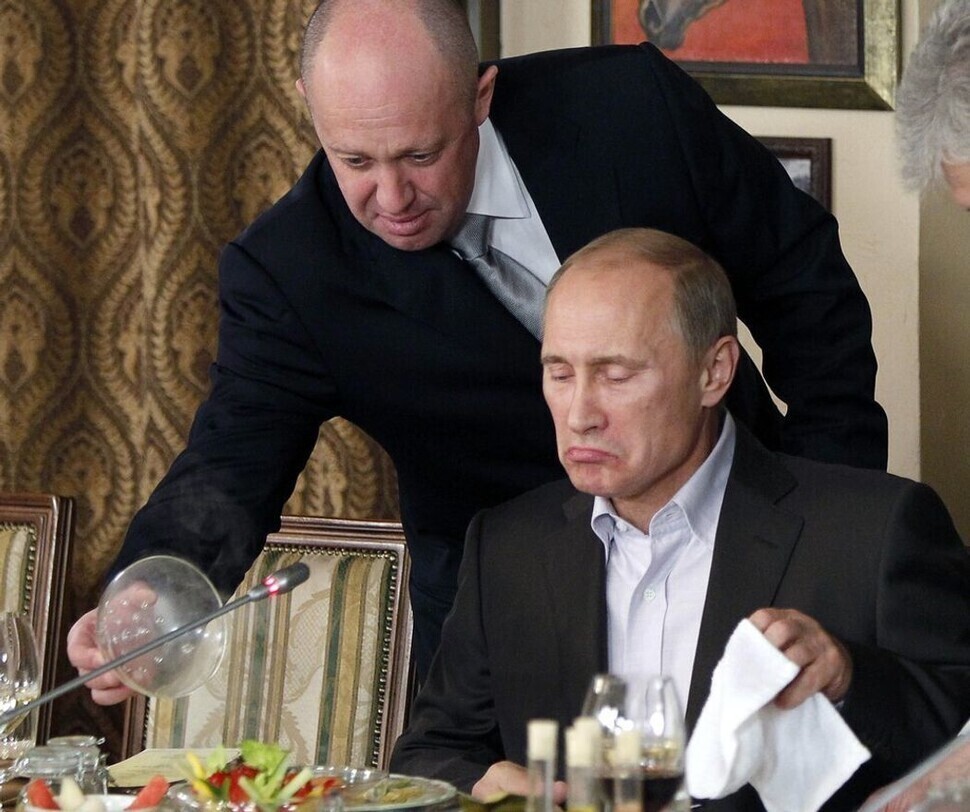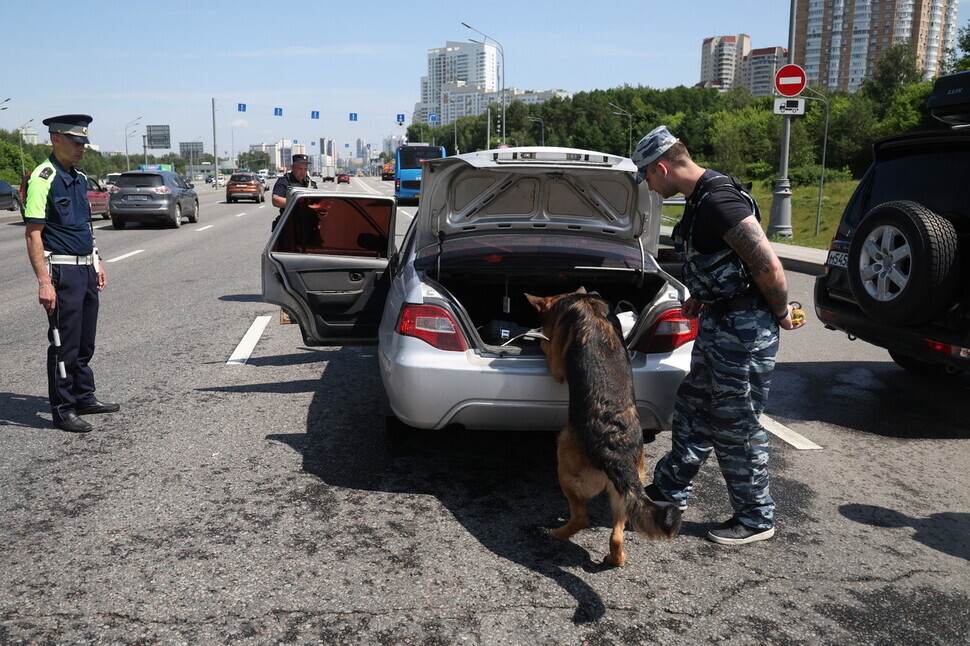hankyoreh
Links to other country sites 다른 나라 사이트 링크
[News analysis] Three variables that will decide Putin’s fate after Wagner mutiny

While the armed mutiny by Yevgeny Prigozhin’s Wagner Group lasted a mere day, the impact it had on the Russian elite who have been buttressing the Putin regime was unimaginable.
Konstantin Remchukov, the editor of a Moscow newspaper with Kremlin connections, summed up the shock felt by the Russian elite in an interview with the New York Times on Sunday (local time), saying, “People close to Putin could seek to persuade him not to stand in for re-election in Russia’s presidential vote next spring.”
This shows that Putin’s position as the “guarantor” of the Russian elite’s wealth and security has been put under scrutiny.
Putin, who succeeded Boris Yeltsin (1931-2007) as Russia’s president in 2000, has used three rounds of constitutional amendments to centralize state power into his hands. Most notable was the third round in 2020, which stipulated that presidential term limits of two 12-year terms would not apply to incumbents.
This guaranteed him power from 2024, the end of his current term, through 2036.
Throughout the process, Putin emphasized stability for Russia. However, the mutiny puts a major dent in the myth that Putin has brought stability to the country following the collapse of the Soviet Union.
Despite Prigozhin’s outrageous declarations, Putin failed to proactively mediate the conflict and thus failed to prevent the rebellion. He also ended up making a political compromise with the very “traitors” he said tried to “stab in the back” Russia.
Three variables are likely to determine Putin’s political career in the coming days.
The first relates to Russia’s official response to the Wagner group.
The soldiers who participated in the mutiny have agreed to voluntarily withdraw in exchange for immunity. As of Sunday, local media reported that they were staying at the military airport in the city of Millerovo in southern Russia.
Kremlin spokesperson Dmitry Peskov said on Saturday that Wagner fighters who did not take part in the mutiny would be eligible to sign contracts with Russia’s Defense Ministry, but avoided commenting on what would happen to those who were part of the revolt.
Wagner mercenaries have proven to be the superior fighters in this war, compared to Russia’s demoralized and poorly trained regular forces.

The second variable is reshuffling the military leadership, including Minister of Defense Sergei Shoigu, who Prigozhin planned to oust, and Chief of the General Staff Valery Gerasimov.
On Monday, the Russian Defense Ministry revealed that Shoigu “inspected the forward command post of one of the units of the Western Military District, working in the zone of the special military operation,” demonstrating that the Russian military is alive and well, in line with Peskov’s assertion the day prior that military leadership would not be replaced.
However, it is unclear whether the military’s top brass, having already exposed its incompetence, will remain at the helm even after the national crisis which saw armed rebels march on the capital. Russian military bloggers who have been denouncing Shoigu and others are making various predictions, forecasting the reappointment of Aleksey Dyumin as defense minister as well as the appointment of Sergei Surovikin, the “General Armageddon” who commanded the war in Ukraine during the second half of last year, as chief of the General Staff.
These two variables ultimately lead to the fundamental question: How will the war in Ukraine end? By revolting, Prigozhin damaged the justification for the special military operation touted by Putin, denying the claim that Russia had no choice but to take military action due to threats to its safety caused by NATO’s eastward expansion but rather arguing that the war began for the interests of the privileged class within the Russian military, such as Shoigu.
Meanwhile, the US gained a pretext to bounce back from the fatigue over Ukraine’s slow-going counterattack and actively provide military support to Ukraine once again. During his Sunday phone conference with US President Joe Biden, Ukrainian President Volodymyr Zelenskyy stressed the need for the West to continue supplying weapons to Ukraine. Biden promised “unwavering US support.”
Boris Yeltsin, Putin’s predecessor, was pushed out of power for displaying incompetence in assuring the wealth and safety of Russia’s elite. Afterward, Putin was handed over power by the powers-that-be of Russia on the condition that he would assure their safety. During an interview with BBC, former Russian Prime Minister Mikhail Kasyanov expressed the view that this incident is the “beginning of the end” for Putin. The reality Yeltsin suddenly faced 23 years ago may be on the horizon for Putin.
By Jung E-gil, senior staff writer; Noh Ji-won, Berlin correspondent
Please direct questions or comments to [english@hani.co.kr]

Editorial・opinion
![[Column] Is Korean democracy really regressing? [Column] Is Korean democracy really regressing?](https://flexible.img.hani.co.kr/flexible/normal/500/300/imgdb/original/2024/0705/2917201664129137.jpg) [Column] Is Korean democracy really regressing?
[Column] Is Korean democracy really regressing?![[Column] How tragedy pervades weak links in Korean labor [Column] How tragedy pervades weak links in Korean labor](https://flexible.img.hani.co.kr/flexible/normal/500/300/imgdb/original/2024/0703/8717199957128458.jpg) [Column] How tragedy pervades weak links in Korean labor
[Column] How tragedy pervades weak links in Korean labor- [Column] How opposing war became a far-right policy
- [Editorial] Korea needs to adjust diplomatic course in preparation for a Trump comeback
- [Editorial] Silence won’t save Yoon
- [Column] The miscalculations that started the Korean War mustn’t be repeated
- [Correspondent’s column] China-Europe relations tested once more by EV war
- [Correspondent’s column] Who really created the new ‘axis of evil’?
- [Editorial] Exploiting foreign domestic workers won’t solve Korea’s birth rate problem
- [Column] Kim and Putin’s new world order
Most viewed articles
- 1[Column] Is Korean democracy really regressing?
- 2Real-life heroes of “A Taxi Driver” pass away without having reunited
- 3Beleaguered economy could stymie Japan’s efforts to buoy the yen
- 4What will a super-weak yen mean for the Korean economy?
- 5Car behind deadly crash began rapid acceleration after exiting underground garage
- 6‘No specific purpose’: Experts on how Big Tech attempts to create demand for AI
- 7[Editorial] Chun Doo-hwan: Gone but never to be forgiven
- 8Experts cast doubt on driver’s claim that sudden unintended acceleration caused deadly crash
- 9South Koreans living near border with North unnerved by return of artillery thunder
- 10Shoddy records help Korean hospitals conceal abuse of mentally ill